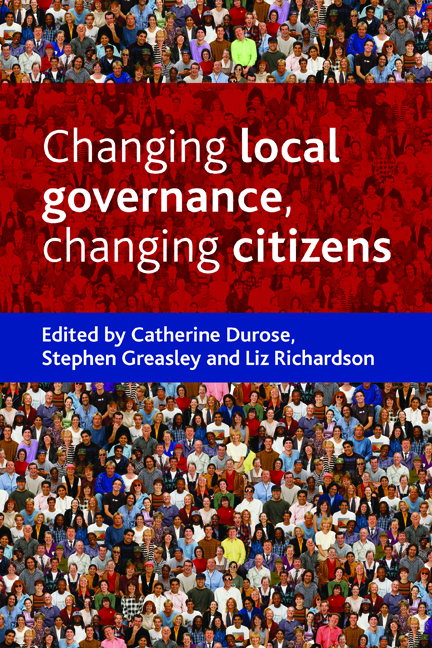Book contents
- Frontmatter
- Dedication
- Contents
- List of boxes and tables
- Acronyms
- Notes on contributors
- Acknowledgments
- Foreword
- Preface
- one Changing local governance, changing citizens: introduction
- two Citizen governance: where it came from, where it’s going
- three ‘Neighbourhood’: a site for policy action, governance … and empowerment?
- four Urban housing market restructuring and the recasting of neighbourhood governance and community
- five Citizen aspirations: women, ethnicity and housing
- six Can we promote cohesion through contact? Intergroup contact and the development of community cohesion
- seven New migrants, citizenship and local governance: ‘Poles’ apart?
- eight Citizens of faith in governance: opportunities, rationales and challenges
- nine Citizens’ reflections on behaviour change policies
- ten Every child’s voice matters?
- eleven e-citizenship: reconstructing the public online
- twelve Conclusion
- Index
eleven - e-citizenship: reconstructing the public online
Published online by Cambridge University Press: 16 July 2022
- Frontmatter
- Dedication
- Contents
- List of boxes and tables
- Acronyms
- Notes on contributors
- Acknowledgments
- Foreword
- Preface
- one Changing local governance, changing citizens: introduction
- two Citizen governance: where it came from, where it’s going
- three ‘Neighbourhood’: a site for policy action, governance … and empowerment?
- four Urban housing market restructuring and the recasting of neighbourhood governance and community
- five Citizen aspirations: women, ethnicity and housing
- six Can we promote cohesion through contact? Intergroup contact and the development of community cohesion
- seven New migrants, citizenship and local governance: ‘Poles’ apart?
- eight Citizens of faith in governance: opportunities, rationales and challenges
- nine Citizens’ reflections on behaviour change policies
- ten Every child’s voice matters?
- eleven e-citizenship: reconstructing the public online
- twelve Conclusion
- Index
Summary
Introduction
The internet and other new information and communication technologies (ICTs) are not intuitively associated with promoting concepts of localism. Indeed, it is a defining feature of these technologies that they are global in their potential and generally uncoupled from localities in their application. It is as easy to access a web page, send an email or meet someone in second life from another continent, as it is to correspond online with a neighbour. In this respect, the internet and its related technologies are a major threat to notions of the local, and particularly to any idea of local citizenship. New technologies threaten to create virtual communities on a global scale – communities that are linked less by geography and more by the shared interests, values or prejudices of individuals, regardless of where they may live. Citizenship in this global context, in so far as it might exist at all, is unlikely to make much reference to place but will be premised on ways in which individuals have needs or interests in common. In the online world, locality is arguably an irrelevance.
At the same time, however, these supposedly global technologies are being enacted in ways that are explicitly local in their focus, with the potential to enhance rather than undermine localities. From the e-government developments of local authorities that enable residents to access services online, through to local applications of global social networking sites such as Facebook, it seems that people are as likely to use the technologies for local purposes as they are to go global. Despite the global reach of these technologies, there is plenty of evidence that both individuals and organisations are not only willing, but also want, to use ICTs to strengthen interactions at the local level. The potential of the internet might be global but its enactment is decidedly local.
This global–local paradox lies at the heart of this chapter. We are interested in the way new ICTs, and especially the internet in all of its various forms (from ‘traditional’ websites through to more recent adaptations of Web 2.0 and social networking), affects notions of citizenship, especially in relation to existing and emerging institutions of local governance.
- Type
- Chapter
- Information
- Changing Local Governance, Changing Citizens , pp. 193 - 210Publisher: Bristol University PressPrint publication year: 2009
- 1
- Cited by



